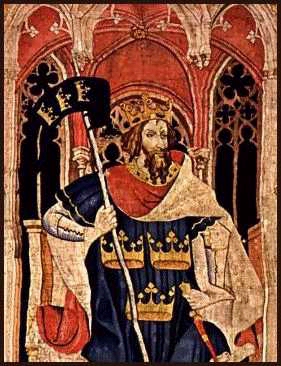

The poem begins with the burning of the city, Troy, and the flight of Aeneas. The great-grandson of Aeneas, Felix Brutus, is also the founder of Britain, and he comes to rebuild the city in Britian. The poem continues to describe how the city is built and says that King Arthur becomes the successor of the throne. The author makes the readers understand that the action is taking place during the winter because he mentions that the king, who is the handsomest of all his guests, is having a Christmas party at Camelot. The text states:
...he is the comeliest king, that that court holds,
For all this fair folk in their first age were still.
Happiest of mortal kind, King noblest fame of will;
You would now go far to find So hardy a host on hill (203).
The author is also very graphic. For example, the author describes the beheading of the Green Knight this way: "...the head was hewn off and fell to the floor; ...The blood gushed from the body, bright on the green..." (Norton, 211).
The passage from lines 60 to 129 of Sir Gawain And The Green Knight describes how the king and his guests celebrate New Year's Day. Before the king enters the room, the food is served to the guests. When the king comes in, everyone stops and the "Clerics and all the court acclaimed the glad season, Cried Noel anew, good news to men" (Norton, 203), which means that the guests exchange greetings with each other. Then men and women hand out gifts, but at the same time they play a kissing game. The entertainment continues until the food is served.
In Sir Gawain And The Green Knight, the unknown author explains his characters' personalities and their appearance. He says that Queen Guenevere is a perfect person, who has no faults. In the meantime, the audience knew better; that is, Queen Guenevere was really adulterous. The verse states: "Guenevere the goodly queen gay in the midst... Fair queen, without a flaw, She glanced with eyes of grey" (Norton, 204). Then the author describes how King Arthur acts in a "boyish" [childish] way, because he will not eat dinner until he hears a tale, or someone comes to challenge him. The king remains standing at his table, speaking with his visitors of "trifles fair," of trivial things, instead of sitting down.
The poet continues
by clearly illustrating how every person is seated at the Round Table,
which really was not round. The Round Table is part of the Arthurian
legend, made for King Arthur so that none of his barons, when seated at
it, could claim precedence over the others. The Gawain author
also demonstrates how the hierarchy system is corrupted. For example,
Sir Gawain, the good knight, sits beside Queen
Guenevere, and on the other side of her sits the evil knight, Agravain.
At the head of the table, where the king should sit, is where Bishop Baldwin
seats himself. Then the son of Urien, Yvain, sits next to the bishop,
and the knights sit along the walls. This is not a customary manner
during this time. The verse states:
There Gawain the good knight by Guenevere
sits,
With Agravain a la dure main on her other side,
Both knights of renown, and nephews of the king
Bishop Baldwin above begins the table,
And Yvain, son of Urien, ate with him there.[...]
At the side-tables sat many stalwart [brave] knights. Norton, 204.
This passage is similar to a description in the poem Beowulf, also written by an anonymous author. In Beowulf, Unferth, son of Ecglaf, sits at the feet of the king of the Scyldings, Hrothgar. Unferth, who has killed his brothers, symbolizes how the royal court has become corrupted.
In the lines from 115 to 129, the author writes about how the feast is celebrated. For example, there is "clamor [noise] of trumpets, drums" and of "noble pipes [bagpipes]" (204-05). Each place is set with twelve of the finest silver dishes. The guests are eating food and drinking wine and beer.
In Sir Gawain And The Green Knight, many details help the reader to visualize the setting of the poem with the burning of the city of Troy and the beheading of The Green Knight. Furthermore, the poet describes how the hierarchical system is beginning to fall apart through the disrespectful treatment of a king. For example, the bishop is seated at the front of the table instead of the king, even though the characters' conduct and appearance appears perfect.